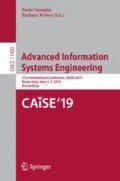Abstract
Often, when requirements are written, parts of the domain knowledge are assumed by the domain experts and not formalized in writing, but nevertheless used to build software artifacts. This issue, known as tacit knowledge, affects the performance of Traceability Links Recovery. Through this work we propose LORE, a novel approach that uses Natural Language Processing techniques along with an Ontological Requirements Expansion process to minimize the impact of tacit knowledge on TLR over process models. We evaluated our approach through a real-world industrial case study, comparing its outcomes against those of a baseline. Results show that our approach retrieves improved results for all the measured performance indicators. We studied why this is the case, and identified some issues that affect LORE, leaving room for improvement opportunities. We make an open-source implementation of LORE publicly available in order to facilitate its adoption in future studies.
Access this chapter
Tax calculation will be finalised at checkout
Purchases are for personal use only
References
Abeles, P.: Efficient Java Matrix Library (2017). http://ejml.org/. Accessed 9 Nov 2017
Apache: OpenNLP Toolkit for the Processing of Natural Language Text (2017). https://opennlp.apache.org/. Accessed 12 Nov 2017
Arora, C., Sabetzadeh, M., Briand, L., Zimmer, F.: Extracting domain models from natural-language requirements: approach and industrial evaluation. In: Proceedings of the ACM/IEEE 19th International Conference on Model Driven Engineering Languages and Systems, pp. 250–260. ACM (2016)
Arora, C., Sabetzadeh, M., Goknil, A., Briand, L.C., Zimmer, F.: Change impact analysis for natural language requirements: an NLP approach. In: IEEE 23rd International Requirements Engineering Conference (2015)
Capobianco, G., De Lucia, A., Oliveto, R., Panichella, A., Panichella, S.: On the role of the nouns in IR-based traceability recovery. In: IEEE 17th International Conference on Program Comprehension, ICPC 2009, pp. 148–157. IEEE (2009)
Carpineto, C., Romano, G.: A survey of automatic query expansion in information retrieval. ACM Comput. Surv. 44, 1:1–1:50 (2012)
Duan, C., Cleland-Huang, J.: Clustering support for automated tracing. In: Proceedings of the 22nd IEEE/ACM International Conference on Automated Software Engineering (2007)
Eder, S., Femmer, H., Hauptmann, B., Junker, M.: Configuring latent semantic indexing for requirements tracing. In: Proceedings of the 2nd International Workshop on Requirements Engineering and Testing (2015)
Falessi, D., Cantone, G., Canfora, G.: Empirical principles and an industrial case study in retrieving equivalent requirements via natural language processing techniques. Trans. Softw. Eng. 39(1), 18–44 (2013)
Ghazarian, A.: A research agenda for software reliability. IEEE Reliability Society 2009 Annual Technology Report (2010)
Gotel, O.C., Finkelstein, C.: An analysis of the requirements traceability problem. In: Proceedings of the First International Conference on Requirements Engineering, pp. 94–101. IEEE (1994)
Landauer, T.K., Foltz, P.W., Laham, D.: An introduction to latent semantic analysis. Discourse Process. 25(2–3), 259–284 (1998)
de Lucia, A., et al.: Enhancing an artefact management system with traceability recovery features. In: Proceedings of the 20th IEEE International Conference on Software Maintenance, pp. 306–315. IEEE (2004)
Marcus, A., Sergeyev, A., Rajlich, V., Maletic, J.: An information retrieval approach to concept location in source code. In: Proceedings of the 11th Working Conference on Reverse Engineering, pp. 214–223 (2004). https://doi.org/10.1109/WCRE.2004.10
Meziane, F., Athanasakis, N., Ananiadou, S.: Generating natural language specifications from UML class diagrams. Requirements Eng. 13(1), 1–18 (2008)
Rempel, P., Mäder, P.: Preventing defects: the impact of requirements traceability completeness on software quality. IEEE Trans. Softw. Eng. 43(8), 777–797 (2017)
Salman, H.E., Seriai, A., Dony, C.: Feature location in a collection of product variants: combining information retrieval and hierarchical clustering. In: The 26th International Conference on Software Engineering and Knowledge Engineering, pp. 426–430 (2014)
Salton, G.: The SMART Retrieval System - Experiments in Automatic Document Processing. Prentice-Hall Inc., Upper Saddle River (1971)
Salton, G., McGill, M.J.: Introduction to Modern Information Retrieval. McGraw-Hill Inc., New York (1986)
Sisman, B., Kak, A.C.: Assisting code search with automatic query reformulation for bug localization. In: Proceedings of the 10th Working Conference on Mining Software Repositories, pp. 309–318 (2013)
Spanoudakis, G., Zisman, A.: Software traceability: a roadmap. Handb. Softw. Eng. Knowl. Eng. 3, 395–428 (2005)
Stone, A., Sawyer, P.: Using pre-requirements tracing to investigate requirements based on tacit knowledge. In: ICSOFT (1), pp. 139–144 (2006)
Sultanov, H., Hayes, J.H.: Application of swarm techniques to requirements engineering: requirements tracing. In: 18th IEEE International Requirements Engineering Conference (2010)
Sundaram, S.K., Hayes, J.H., Dekhtyar, A., Holbrook, E.A.: Assessing traceability of software engineering artifacts. Requirements Eng. 15(3), 313–335 (2010)
Watkins, R., Neal, M.: Why and how of requirements tracing. IEEE Softw. 11(4), 104–106 (1994)
Winkler, S., Pilgrim, J.: A survey of traceability in requirements engineering and model-driven development. Softw. Syst. Model. (SoSyM) 9(4), 529–565 (2010)
Wohlin, C., Runeson, P., Höst, M., Ohlsson, M.C., Regnell, B., Wesslén, A.: Experimentation in Software Engineering. Springer, Heidelberg (2012). https://doi.org/10.1007/978-3-642-29044-2
Acknowledgements
This work has been partially supported by the Ministry of Economy and Competitiveness and ERDF funds under the project Model-Driven Variability Extraction for Software Product Lines Adoption (TIN2015-64397-R). We also thank the ITEA3 15010 REVaMP2 Project.
Author information
Authors and Affiliations
Corresponding author
Editor information
Editors and Affiliations
Rights and permissions
Copyright information
© 2019 Springer Nature Switzerland AG
About this paper
Cite this paper
Lapeña, R., Pérez, F., Cetina, C., Pastor, Ó. (2019). Improving Traceability Links Recovery in Process Models Through an Ontological Expansion of Requirements. In: Giorgini, P., Weber, B. (eds) Advanced Information Systems Engineering. CAiSE 2019. Lecture Notes in Computer Science(), vol 11483. Springer, Cham. https://doi.org/10.1007/978-3-030-21290-2_17
Download citation
DOI: https://doi.org/10.1007/978-3-030-21290-2_17
Published:
Publisher Name: Springer, Cham
Print ISBN: 978-3-030-21289-6
Online ISBN: 978-3-030-21290-2
eBook Packages: Computer ScienceComputer Science (R0)

